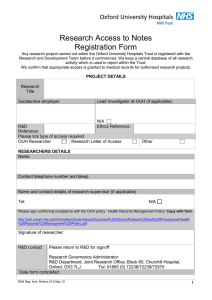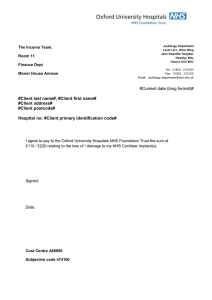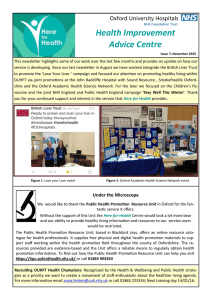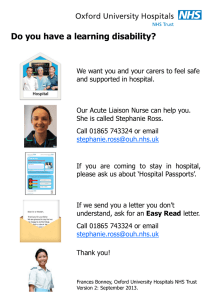Briefing on Oxford University Hospitals
advertisement
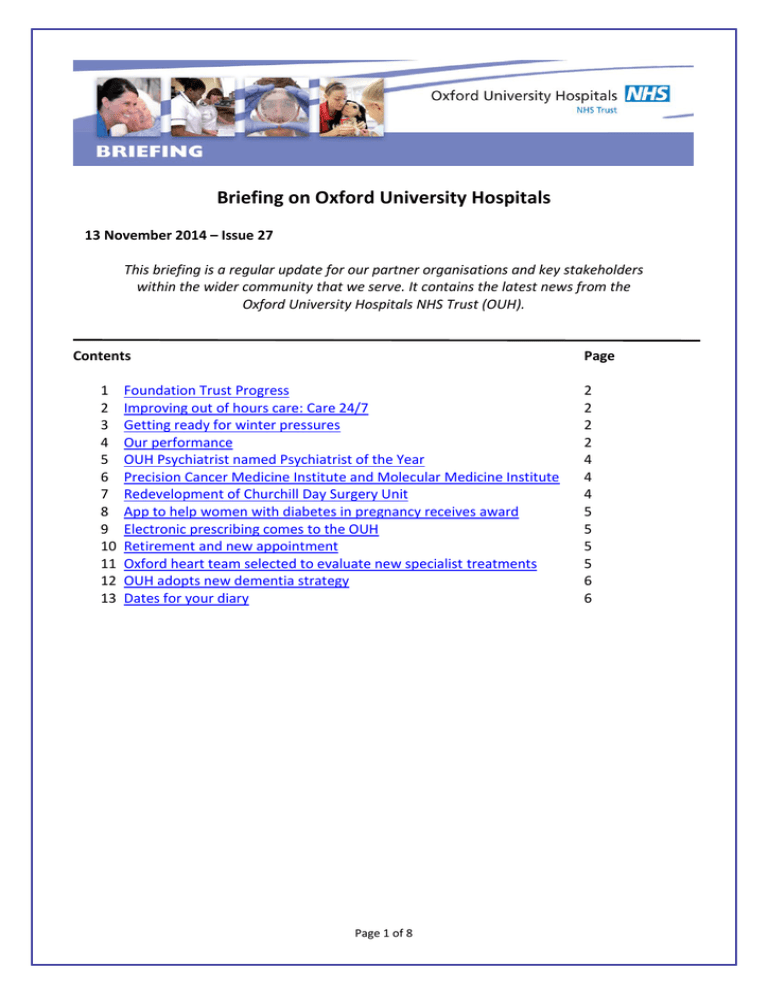
Briefing on Oxford University Hospitals 13 November 2014 – Issue 27 This briefing is a regular update for our partner organisations and key stakeholders within the wider community that we serve. It contains the latest news from the Oxford University Hospitals NHS Trust (OUH). Contents 1 2 3 4 5 6 7 8 9 10 11 12 13 Page Foundation Trust Progress Improving out of hours care: Care 24/7 Getting ready for winter pressures Our performance OUH Psychiatrist named Psychiatrist of the Year Precision Cancer Medicine Institute and Molecular Medicine Institute Redevelopment of Churchill Day Surgery Unit App to help women with diabetes in pregnancy receives award Electronic prescribing comes to the OUH Retirement and new appointment Oxford heart team selected to evaluate new specialist treatments OUH adopts new dementia strategy Dates for your diary Page 1 of 8 2 2 2 2 4 4 4 5 5 5 5 6 6 1 Foundation Trust progress Oxford University Hospitals continues to make progress towards becoming a Foundation Trust. We have now been passed to Monitor, the body that assesses and regulates Foundation Trusts. They are assessing us over what is expected to be a four-month period, to examine whether we are well-governed, financially viable and legally constituted. The Trust has agreed with Monitor that elections can be held for the Council of Governors so that it can be formed and ready to operate from March 2015. The timetable has been agreed as below. Event Notice of Election Deadline for Receipt of Nominations Publication of Statement of Nominations Deadline for Candidate Withdrawals Notice of Poll / Issue of Ballot Packs Close of Poll – 5.00pm Declaration of Result Date Monday 1 December 2014 Monday 12 January 2015 Tuesday 13 January 2015 Thursday 15 January 2015 Tuesday 27 January 2015 Thursday 19 February 2015 Friday 20 February 2015 OUH has 8,300 public members from Oxfordshire and surrounding areas and is encouraging more people to join before elections are held to the Council of Governors. Further details of what is involved and online membership forms so that you can join and put yourself forward to become a governor, are on the Trust’s website at www.ouh.nhs.uk/ft 2 Improving out of hours care: Care 24/7 As part of the Trust’s challenge of ensuring that care for patients is of a consistently high quality whatever time of day or day of the week that it might be, the Trust has launched a 24/7 Care Transformation Project to look at services in each of our hospitals that may need further investment, changes or improvements. So far, we have used the provision of Winter Pressures Funding to improve access to pharmacy out of hours and at the weekend and improved access to radiology opinion out of hours. We are currently looking at ways to improve the way the clinical team work out of hours at the Horton, including providing some additional IT support, and will then use the same sorts of protocols to improve co-ordination out of hours at the Churchill Hospital. More detail can be found in the Trust Board paper here: Trust board paper on Out of Hours Care November 2014 3 Getting ready for winter pressures The Trust is currently implementing a series of initiatives designed to increase capacity, improve the flow of patients through our hospitals (improving the process of both admitting and discharging patients) and enhance seven day working in preparation for the expected seasonal Page 2 of 8 increase in patients. For more information see: Trust board paper on winter preparedness November 2014 4 Our performance Infection control The Trust has been given a target of having no avoidable cases of MRSA this year and no more than 67 cases of C Difficile. The Trust has had one unavoidable case of MRSA in September but continues to have no avoidable MRSA cases. The total number of cases of C Difficile to September 2014 was 31. Delayed transfers of care Delayed Transfers of Care remain a major cause of concern for the Trust. At the end of September the number of delays was at 10.3% which is 6.8% above the target of 3.5%. The monthly average for September was 136 delays across the system for Oxfordshire residents. Finance The Trust is reporting we have delivered £17.2 million in savings in the first half of the year, which represents 90% of the year to date plan. Spending on staff, including agency costs is higher than planned and agency costs are both higher in volume and as a proportion of the Trust’s total pay bills. The Trust’s financial position was £33,000 better than plan against its financial duty at the end of the first half of the year. Work continues to ensure that the Cost Improvement Programme remains on target. For more information on the Trust’s financial performance, please see the latest Trust Board paper: Trust board paper on financial performance November 2014 Operational performance Access targets The OUH achieved the four hour standard of over 95% of patient been seen, treated, admitted or discharged within four hours in August 2014. In September the Trust was unable to accurately report the final three days’ data because of an upgrade to our patient record system, although up to Thursday 25 September the Trust was on track to achieve 95%. We are trying to verify the statistics so that we can report this in due course. In October the standard was missed with 94.1% of patients being seen, treated, admitted or discharged within the timeframe. We are making further changes to the way in which we staff the Emergency Departments and how we manage patients in the departments to improve performance. Subject to final validation of the figures, the Trust met the standards for all cancer waits except for 62 day urgent treatment in September. This follows work to increase the number of sessions of radiotherapy at the Oxford Cancer Centre. The Trust continues to do well in its treatment of stroke patients, with a higher percentage of patients on a dedicated stroke unit than the NHS standard requires. Fewer people are now waiting more than six weeks for diagnostic tests with fewer than 1% of patients waiting more than six weeks (the NHS standard). Page 3 of 8 The Trust is not yet meeting its 18 week wait standards. We just missed the target of 95% of outpatients seen within 18 weeks in September with 94.48% of patients seen within the timescale. For inpatients, we also just failed to meet the target of 90% with 87.29% being seen within 18 weeks. However, for those patients whose treatment is incomplete, we met the target achieving 92.03% against the 90% target. There are currently 21 patients waiting over 52 weeks in September - down from 39 in July. An action plan has been developed to significantly reduce or eliminate all 52 week waits originally by March 2015 but we now hope to deliver this by November 2014. For greater details on the Trust’s latest performance, please see the latest Trust Board paper here: Trust board paper on Performance November 2014 5 OUH Psychiatrist named Psychiatrist of the Year Professor Michael Sharpe, Trust lead for Psychological Medicine was named 'Psychiatrist of the Year' at an awards ceremony held in London on 6 November. Professor Sharpe was awarded for his work in research and clinical service development to integrate psychiatry into medicine. In particular, he was given the award for his development of the Psychological Medicine Service at OUH and for his research into the treatment of patients with cancer and depression. Understood to be the first of its kind, the unique service at OUH provides psychiatric and psychological care to patients during their stay in hospital. The Royal College of Psychiatrists (RCPsych) Awards, now in their sixth year, continue to recognise and celebrate excellence in psychiatry and mental health services. 6 Precision Cancer Medicine Institute and Molecular Medicine Institute On 23 October, the Higher Education Funding Council for England announced a £35 million contribution towards the £110 million Precision Cancer Medicine Institute that will be established on the University of Oxford Old Road campus site at the Churchill Hospital. The Institute will carry out research into a wide range of cancer therapies including the use of genomics and molecular diagnostics, advanced cancer imaging, trials of new drugs, minimally invasive surgery and proton beam therapy. Patients at the Cancer and Haematology Centre at the Churchill Hospital will be able to benefit from the latest therapies being trialled at the Institute and the joint clinical working between the Trust and the University will ensure seamless patient care. On the same date, a research partnership between the Chan Soon-Shiong Institute for Molecular Medicine in the USA and the University of Oxford was announced to create the Chan Soon-Shiong Oxford Centre for Molecular Medicine, which is likely to be housed within the Precision Cancer Medicine Institute. This will allow the clinical applications of its research to take place there in close collaboration with the OUH. Page 4 of 8 The Molecular Medicine Institute will use the latest techniques to analyse tumour samples from patients so that clinicians and researchers can understand the particular genetic and molecular changes that underly the patient’s cancer, leukaemia or lymphoma. For more information see Precision Cancer Medicine Institute 7 Redevelopment of Churchill Day Surgery Unit The Trust Board on 12 November agreed a £1.83 million investment to reconfigure the Day Surgery Unit at the Churchill Hospital. The aim is to improve the experience of patients using the unit in particular through providing greater privacy and separate areas for men and women. Patients who have used the current unit were consulted for their views on the proposals and have been very supportive. For more detail on this please see Trust Board paper on redevelopment of Churchill Day Surgery Unit November 2014 8 App to help women with diabetes in pregnancy receives award Every year hundreds of women due to give birth at the John Radcliffe Hospital in Oxford, develop gestational diabetes (diabetes affecting women who are pregnant). It affects about one in ten pregnancies. The conventional treatment is for the patient to manage and record their blood glucose levels up to six times a day with their medication dose adjusted on fortnightly check-ups in hospital during the pregnancy. However, an Oxford project (a collaboration between Oxford University Hospitals and the University of Oxford, funded by the Oxford Biomedical Research Centre) have developed a smartphone app that enables diabetes specialists to monitor their patients remotely. Software on the healthcare team’s website allows them to view blood glucose results in real time and gives them the opportunity to text advice and directions on medication adjustments. Patients have welcomed the system of remote monitoring. It helps reduce the risk of ill health during pregnancy for women with gestational diabetes, and helps reduce the number of tiring, time-consuming and expensive hospital appointments. The technology was developed with patient input by Professor Lionel Tarassenko, Professor of Electrical Engineering and Head of Engineering at the University of Oxford, and his research group. It has now won a national prize. The team behind the GDm-Health gestational diabetes smartphone app received the Best Digital Initiative trophy at the Quality in Care Diabetes Awards on 16 October 2014. For more about this app and the award please see Award for app to help pregnant women with diabetes 9 Electronic prescribing comes to the OUH As part of the Trust’s Electronic Patient Record system to improve patient’s experience of our services, we have now implemented electronic prescribing and medicines administration to speed Page 5 of 8 up the issuing of medicines and reduce errors. The Trust is the first in the country to introduce this new system in conjunction with a robotic dispenser, and it is already improving the speed by which clinicians can get prescriptions to the pharmacy and therefore to patients, as well as reducing the chance of data entry error or misinterpretation. 10 Retirement and new appointment Chief Executive of Oxford University Hospitals NHS Trust Sir Jonathan Michael has notified the OUH Board of his intention to retire from the NHS by the middle of next year. This early notification provides the Board with sufficient time to plan and commission a thorough national and international search, through which to identify a successor. A recruitment process will begin very soon. Dr Tony Berendt has been appointed as the Trust’s substantive Medical Director. Dr Berendt has been our interim Medical Director since April and was Deputy Medical Director from November 2011. Prior to that Dr Berendt was Medical Director at the Nuffield Orthopaedic Centre NHS Trust. 11 Oxford heart team selected to evaluate new specialist treatments The Oxford University Hospitals Cardiology Department has been commissioned to carry out two heart procedures as part of a national evaluation. Both treatments involve devices being used inside the heart to reduce future risk of stroke. Oxford is one of a limited number of heart centres selected by NHS England to take part in its £15m Commissioning Through Evaluation programme, which assesses promising specialised treatments where there is not yet enough evidence to support routine commissioning within the NHS. For more about this project, please read: Oxford cardiology team selected for evaluation of specialist treatments 12 OUH adopts new dementia strategy At its Board meeting on 12 November the Trust approved a new strategy to improve the experience for patients with dementia. The first step is to improve screening of patients to identify those who may have dementia or another cognitive impairment. The Trust has introduced a new screening tool which is very successful in identifying need and has been already implemented fully in areas where there are a large number of patients who will benefit from this kind of diagnosis. We are in the process of expanding this across all services. The Trust has also implemented a number of dementia friendly initiatives and physical changes on our wards and hospital areas to improve the experience for patients with dementia. This includes ways to help patients identify their beds etc, and discreet identification of patients with dementia so that staff know to offer additional assistance. All patient facing staff are being trained in how to support patients with dementia and their families and carers. Page 6 of 8 For more on the strategy please see: Trust board paper on the OUH dementia strategy 2014-17 November 2014 13 Dates for your diary Oxford Biomedical Research Centre – Bringing research to life through public talks All talks are at the Lecture Theatre, Level 1, Nuffield Orthopaedic Centre and start at 6.30pm. Light refreshments are served from 6.00pm. Please let us know if you are planning to attend, as places are limited. Please register with Caroline Rouse by contacting her on ouhmembers@ouh.nhs.uk or on 01865 743491. Development of improved influenza vaccines Thursday 27 November 2014 - Professor Sarah Gilbert, Professor of Vaccinology at the Jenner Institute Vaccines against seasonal influenza are widely used, particularly in those aged over 65 years, but vaccine efficacy is variable and far from optimal in older adults. The Jenner Institute at the University of Oxford has been developing vaccines that they predict will have higher efficacy, and conducting clinical trials of these novel vaccines. In addition to developing the vaccines it is necessary to find novel ways to test them, and both these aspects of vaccine development will be covered in the talk. Talks for Foundation Trust members in Banbury A talk for Foundation Trust members will be held in Banbury at the Mills Arts Centre and will start at 6.30pm. Tea and coffee will be served from 6.00pm. Please let us know if you are planning to attend, as places are limited. Please register with Caroline Rouse by contacting her on ouhmembers@ouh.nhs.uk or on 01865 743491. Dementia and delirium: the impact of stroke and acute illness on thinking and memory Monday 24 November 2014 - Dr Sarah Pendlebury, Trust Lead on Dementia Care, Honorary Consultant Physician and Gerontologist The talk will cover what dementia is, some of the potential causes and the ways in which thinking and memory can change over time. It will also cover how thinking and memory may change very rapidly with acute illness, e.g. a stroke, and also disorders outside the brain, including infections. Finally, it will cover how patient care in hospital and the community needs to take account of thinking and memory problems, and what we are doing at Oxford University Hospitals to facilitate this. To register to attend the talk, please contact: Caroline Rouse: ouhmembers@ouh.nhs.uk / 01865 743491 Public seminars Thinking About the Brain – at the Ashmolean Museum of Art and Archaeology Thursday 20 November 2014, 5.30 – 8pm This public seminar forms part of the developing collaboration between the Ashmolean Museum University Engagement Programme and Oxford’s Nuffield Department of Clinical Neurosciences. Page 7 of 8 Co-organised by Dr Jim Harris, Andrew W Mellon Foundation Teaching Curator at the Ashmolean and Dr Chrystalina Antoniades, Lecturer in Medicine at Brasenose College and Senior Research Fellow in the Nuffield Department of Clinical Neurosciences, the evening will offer an opportunity to explore current research into the brain and the mind from a wide range of perspectives, from medieval literature to contemporary art and neuroscience. The seminar is the second in a series initiated in 2013 by Jim Harris and Professor Robin Choudhury with Seeing the Human Heart. Speakers include Professor Chris Kennard, Professor of Clinical Neurology and Head of the Nuffield Department of Clinical Neurosciences Open to all and free of charge To ensure a place, please register by emailing jim.harris@ashmus.ox.ac.uk For more information see http://www.ouh.nhs.uk/news/events/documents/tab-programme.pdf This briefing was prepared by: Susan Brown Senior Communications Manager Head of Stakeholder Engagement and Foundation Trust Membership Oxford University Hospitals Tel: 01865 231475 Email: susan.brown@ouh.nhs.uk 13 November 2014 Page 8 of 8
